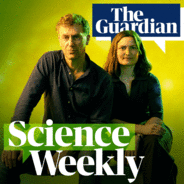Despite research into a male contraceptive pill starting around the same time as its female counterpart, no product has ever made it to market. But that could soon change, with a new non-hormonal male pill entering human trials in the UK late last year. Ian Sample speaks to bioethicist Prof Lisa Campo-Engelstein of the University of Texas and Prof Chris Barratt from the University of Dundee about why male contraceptives have been so difficult to develop, and what kind of options are in the pipeline. Help support our independent journalism at theguardian.com/sciencepod

Wissenschaft & Technik
Science Weekly Folgen
Twice a week, the Guardian brings you the latest science and environment news
Folgen von Science Weekly
300 Folgen
-
Folge vom 08.02.2024Why are we still waiting for a male contraceptive pill?
-
Folge vom 06.02.2024What happens now bird flu has reached the Antarctic?The moment scientists had been dreading arrived late last year, when H5N1, or bird flu, was found for the first time in the Antarctic. Last week a king penguin on the island of South Georgia became the first in the region to be suspected to have died from the disease. The Guardian’s biodiversity reporter, Phoebe Weston, tells Ian Sample why researchers have said the spread of bird flu through the Antarctic’s penguin colonies could signal ‘one of the largest ecological disasters of modern times’. Help support our independent journalism at theguardian.com/sciencepod
-
Folge vom 01.02.2024A fasting prime minister and a mind-reading billionaire: the week in scienceIan Sample and science correspondent Hannah Devlin discuss the big science stories of the week – from news that Elon Musk’s Neuralink has implanted its first chip into a human, to research suggesting Alzheimer’s can pass between humans in rare medical accidents, and the revelation that Rishi Sunak begins each week with a 36-hour fast. Help support our independent journalism at theguardian.com/sciencepod
-
Folge vom 30.01.2024Secrets of the microbiome: the skinThe trillions of microbes living on and inside the human body are an important part of who we are, from mediating all of our interactions with the environment to determining our cancer risk and influencing who we fall for. And scientists are only just beginning to decipher the species of bugs we share our lives with, and how they shape us. In the final part of this Science Weekly mini-series, Ian Sample meets Julie Thornton, academic director of the Centre for Skin Sciences and professor in cutaneous biology at the university of Bradford. Julie tells Ian how the skin microbiome varies across our bodies, how it helps with everything from wound healing to immunity, and how we can protect it from the disruptive impact of modern life.. Help support our independent journalism at theguardian.com/sciencepod
